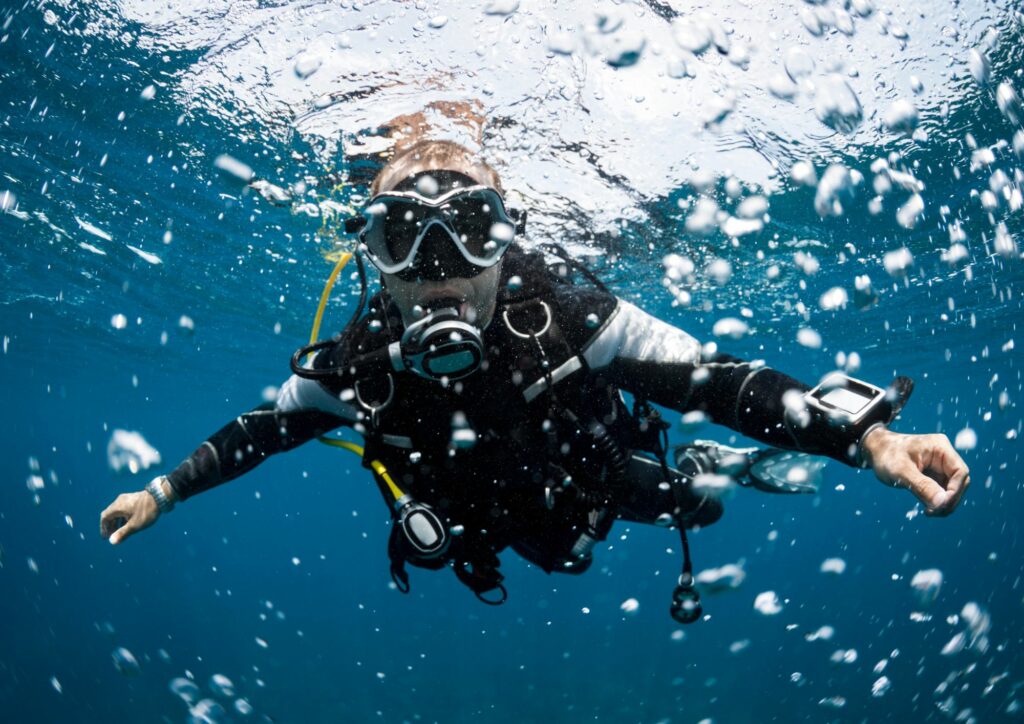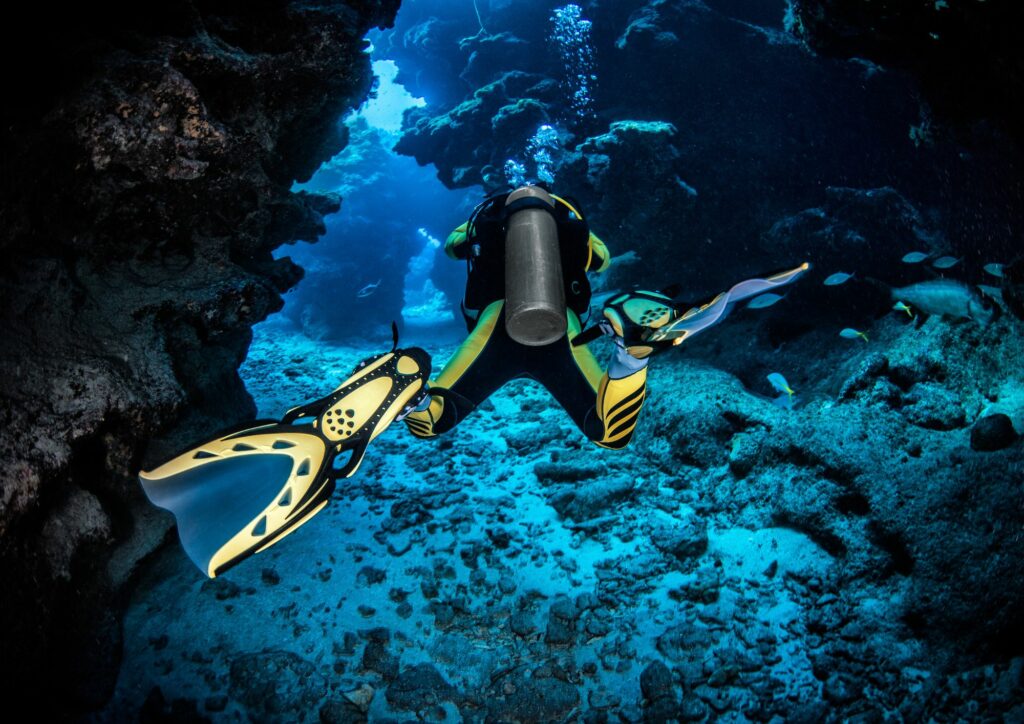Beneath the waves lies an unfamiliar world that many of us are yet to explore. Scuba diving offers the chance to unravel the secrets of the deep sea, yet it is often beset with a barrage of myths and misconceptions. Through this blog post, we’ll uncover the truths behind common scuba diving misconceptions, bust diving myths, and reveal some enlightening scuba diving truths and facts. Prepare to embark on a journey that redefines your understanding of the underwater realm. Let the debunking dive myths adventure commence!
Myth 1: Scuba Diving is only for the Sporty and Adventurous
Many people believe that scuba diving is an extreme adventure sport exclusively for the athletic and thrill-seekers. However, this perception couldn’t be further from the truth. Scuba diving is actually a casual pastime that can be enjoyed by individuals with a variety of abilities and fitness levels. Contrary to popular belief, It’s much less physically demanding than it appears and does not necessitate a strong athletic physique or advanced swimming ability.
The emphasis of scuba diving is on relaxation, comfort, and the pure joy of witnessing the awe-inspiring beauty of the underwater world in its most raw and authentic form. So, anyone who is comfortable in the water, regardless of their physical strength or agility, can relish in the tranquility and beauty that scuba diving offers.
Myth 2: You Must Be a Great Swimmer to Scuba Dive

It is often assumed that superior swimming skills are a prerequisite for scuba diving, leading to the exclusion of those who aren’t well-versed swimmers. However, this couldn’t be further from the truth. A basic level of comfort in water is certainly required, but that does not mean you must be an Olympic-level swimmer to enjoy diving. In reality, scuba diving is more about buoyancy control and breathing comfortably underwater. It does not depend on one’s swimming speed, endurance or even style. Learning to float, move, and maneuver underwater with the assistance of diving gear can often require a different set of skills than those needed for traditional swimming.
Myth 3: Diving is Dangerous
An often misunderstood aspect of scuba diving is its safety. With sensationalist news stories, it’s easy to fall into the trap of thinking that diving has high risks attached. Yet, safety is paramount in scuba diving activities. It necessitates rigorous training, certification, and practices in accordance with specific regulations. When all these safety protocols are duly followed, scuba diving is one of the safest recreational activities you can engage in. Accidents, while tragic, are rare and largely preventable if divers are properly trained and follow the guidelines.
Myth 4: Only the Tropics Have Good Dive Sites
When one pictures scuba diving, turquoise tropical waters teeming with colorful corals and marine life often come to mind. This leads to the misconception that only tropical locales have worthwhile dive sites. Yet the beauty of diving is in its variety. While tropical waters indeed offer stunning coral reefs, even in colder regions you can find a surprisingly rich diversity in marine life, intriguing underwater landscapes, and historical shipwreck sites. The joy of diving is about exploring and appreciating the unique beauty diverse marine ecosystems across the globe offer.
Myth 5: Marine Creatures are Dangerous
Many potential divers are deterred by fears of encountering dangerous marine animals such as sharks. Indeed, the infrequent, but highly publicized reports of shark attacks can make these creatures seem like a common threat. However, such incidents are incredibly rare. Most marine creatures are in fact quite harmless when not threatened or provoked. It’s crucial to remember that as divers, we are merely guests in their underwater home. By respecting marine life and maintaining an awareness of our surroundings, most accidents can be effectively avoided.
Myth 6: It’s too Expensive
Scuba diving, like any hobby, can seem expensive at first glance. However, the cost of diving can widely vary based on numerous factors such as equipment, location and dive type. There is quite literally an option for every budget, whether you’re a beginner looking to try it out or an experienced diver aiming to advance your skills. Once you’ve invested in the initial costs like gear and certification, the beautiful realm of the underwater world becomes an affordable wonder, ready to be explored often at a fraction of the initial cost.
Myth 7: Diving is Difficult to Learn
The perception that scuba diving has a difficult learning curve is also common among beginners. However, with the help of professional instructors and well-structured scuba training courses, you can learn everything needed to dive safely and confidently in a step-by-step, straightforward manner. The process of learning to dive, far from being unnerving or complex, is made into an enjoyable journey where each new skill or knowledge imparts a sense of accomplishment and excitement to experience the undersea world.
Myth 8: Breathing Underwater feels Unnatural
The prospect of breathing underwater can feel daunting and against human instinct for first-time divers. Yet, with modern innovations in scuba equipment, these concerns are effectively alleviated. With practice and correct guidance, adjusting to the sensation of breathing underwater can be a smooth and comfortable process. The apparatus of modern scuba gear is specifically designed to simulate natural respiratory patterns under water, enabling you to breathe just like you would on land.
Myth 9: Diving Destroys Underwater Ecosystems
There is a belief that divers contribute to the degradation of underwater ecosystems and coral reefs. While it is true that careless diving can potentially damage these fragile environments, the scuba diving community at large is heavily involved in marine conservation. Certified divers are trained on precautions and best practices to minimize their impact on underwater ecosystems. Many divers actively participate in conservation projects, like reef cleanups and bio-diversity studies, making them part of the solution to the very problem they’re erroneously accused of causing.
Myth 10: If You Have a Medical Condition, You Can’t Dive
A common misconception surrounds medical conditions and scuba diving. Many believe that having a pre-existing medical condition automatically disqualifies you from diving. However, many medical conditions can indeed be safely accommodated within recreational diving limits, provided they’re managed and assessed properly. It is imperative to consider a detailed medical evaluation before diving and follow advice thereafter. Therefore, rather than self-diagnosing, leave the medical evaluations to the experts. Always consult your doctor or a medical professional trained in diving medicine to accurately judge whether you are fit to dive or not.
Hitting the Surface: Tracing the Bubbles of Truth
There you have it, fellow divers and aspiring aquanauts. Our dive into the depths of scuba diving misconceptions may have altered your perspectives, shattered long-standing myths and revealed some enlightening truths about this wonderful pastime. Scuba diving is truly an accessible and enjoyable activity that offers unique experiences, thrilling discoveries, and personal challenges in each descent. Diving facts aren’t as fearsome as you think, and neither is the underwater world. So gear up, get trained, and be ready to embrace the diving truths head-on. The underwater realm is calling!

I really enjoyed reading this post! It’s great to see so many common misconceptions about scuba diving being debunked. I particularly liked the section on myth #2, it’s true that you don’t have to be a strong swimmer to go scuba diving.
Hi Fatima, thanks for sharing your thoughts on our blog post! We’re glad you found it informative and helpful. It’s great to hear that the section on myth #2 resonated with you – we definitely agree that scuba diving doesn’t require strong swimming skills. If you have any more questions or concerns about scuba diving, feel free to reach out to us at +65 6734 9373 or [email protected]. We’re always here to help! Looking forward to hearing your next thoughts on the underwater world.
I never thought about how accessible scuba diving is, even for those who aren’t athletic. I’m definitely going to look into taking a course and exploring the underwater world.
Hi Ahmed! I’m thrilled to hear that our blog post has inspired you to explore the world of scuba diving! You’re absolutely right, accessibility is a major misconception about diving. With proper training and guidance, anyone can enjoy this incredible hobby regardless of their physical abilities. We highly recommend taking a course with a reputable instructor who will teach you the necessary skills and safety protocols. Our team at Gill Divers would be more than happy to help you get started on your diving journey! Feel free to contact us at +65 6734 9373 or email [email protected] for any questions or concerns. We look forward to seeing you in the water soon!
I loved this post! It’s so important to dispel myths about scuba diving. I’ve been wanting to try it out for a while now, and this has given me the confidence to do so.
Hi Siti Fatimah, thank you so much for your enthusiastic feedback! We’re thrilled to hear that our post has given you the confidence to try scuba diving. Remember, it’s always a great idea to take a beginner’s course and learn from certified instructors before diving into (pun intended!) the deep end. And don’t forget, at Gill Divers, we’re here to support you every step of the way! Feel free to reach out to us anytime for more information or guidance. Looking forward to hearing about your first dive experience!